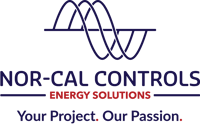Pandemic-related global supply chain issues haven't spared the renewable energy industry. At the same time, industry growth continues full speed ahead. Projects must get done despite the challenges—and that requires creativity, collaboration and constant communication.
We sat down with Matt Winchell and Kevin Woodard, managers of Nor-Cal's Business Development and Equipment Procurement (EP) teams, respectively. They shared what they've learned about mitigating supply chain challenges in the renewable energy industry, including valuable guidance for EPCs and owners.
How have global supply chain issues affected the renewable energy industry?
Global supply chain issues have caused large price fluctuations for both raw materials and major components. The cost for EPCs to build projects has also increased substantially. At Nor-Cal, we've also seen lead times increase for many of the off-the-shelf components we utilize for our SCADA and data solutions.
How are these supply chain challenges changing Nor-Cal operations?
We've evolved our processes in response to these supply chain challenges—both internally and externally with our customers.
- We communicate with customers much more frequently to stay ahead of projects and to ensure we can order necessary equipment earlier in the process.
- We meet more often internally to ensure that each department has visibility into new projects and equipment is ordered as early as possible. We identify potential supply chain risks on projects and communicate them to the customer.
This is an organization-wide collaborative effort—from Proposal Coordination to Project Management (PM). It requires an open flow of communication from start to finish, as well as the ability to find and propose the best solutions to help our customers.
Do you have any suggestions for EPCs or owners to help with the current situation?
Our primary suggestion for EPCs and owners is to plan ahead as much as possible.
Owners, EPCs, and integrators all have unique supply chain challenges, but the solutions are similar. By working together on creative solutions, being flexible, and ensuring adequate time for all phases of the project, all stakeholders can experience great success. Frequent communication between the parties is crucial for successful projects now and for continued growth moving forward.
How does Nor-Cal work with suppliers to ensure necessary materials are available when needed?
Our EP team provides forecasting and required-by dates much sooner in the process than we did previously, based on information from Proposal Coordination. We work with our vendors to determine what's been impacted by supply chain issues, what's available, and if alternatives are available and/or needed in order to meet the contractual dates.
How are you proactively communicating with customers to help them plan for supply chain challenges?
It's critical to get funds allocated far in advance in order to secure resources and to get deliverables on time. We set up recurring account management calls with all customers to stay on top of resourcing and project schedules from a 10,000-foot view. We frequently engage with our contacts on a project-specific basis to keep timelines at the forefront. If anything has to be pushed or pulled due to supply chain challenges, we ensure the customer is in the loop.
Given the uncertain supply chain environment, what is the ideal proposal and execution schedule for EPCs?
Our typical lead times used to be four to five months—the industry standard at the time. We now recommend getting started eight to nine months prior to when the EPC wants the SCADA equipment onsite. In this market climate, it's better to plan ahead and have some wiggle room versus being locked into a tight timeline.
What is an example of when you got creative to meet a demanding schedule?
On one recent project, we proposed the standards and then discovered that none of the requested materials would be available in time. Thankfully, we had similar materials available in stock. We communicated openly with the customer about the proposed replacements and got approvals to move forward. We worked with the PM to ensure they and the customer understood the cost impact. Then we changed everything—from our Bill of Materials (BOM) to our design—to ensure we could meet the required deadlines with the available materials.
It was a change in our Business Development processes that allowed for this flexibility. Pre-pandemic, we typically did a full notice to proceed with our customers—meaning we would get the full contract award and move forward from there. We now recommend moving forward on a limited notice to proceed basis, which allows for more flexibility and visibility in the timeline. We can get more creative with ordering without having the full financial impact realized by our customers.
This flexible and creative approach requires a collaborative effort. It goes beyond Proposal Coordination, EP, and PMs to include Accounting, Operations, Engineering and Production. These teams work together to ensure we meet requirements and specs while keeping on top of changes. It's absolutely a full team effort.
Nor-Cal has always been a collaborative team, but mitigating supply chain challenges has taken us to a different level. We've come together to ensure we're doing everything in our power to stick to our operational standards and present a great product to our customers.
If you have an upcoming SCADA project, you need an integrator who can help you navigate ever-changing market conditions. Schedule a call with us today.





